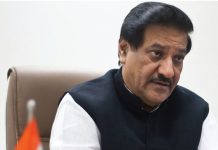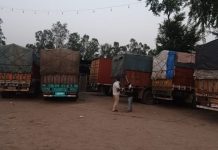
ALTHOUGH THE police in the various states made a huge ruckus with their presence on the two or three days the SIMI tribunal held its hearing in their cities during June-July, 2008, the overwhelming dominance of the police was nowhere more evident than in Bhopal during July 1-3, where the Centre presented SIMI-related cases from Madhya Pradesh. As uniformed officers and their subordinates with guns holstered had the premises in their control, many plainclothesmen also moved around the government building where the makeshift courtroom had been prepared for the tribunal, perhaps keeping an eye out for troublemakers.
It was, then, no small act of courage when a fear-stricken group of Muslims, numbering about a dozen and clearly of little means, landed at the tribunal hearings most tentatively and, speaking meekly, urged their plea be taken up. All travelling to Bhopal from small towns near and far, they had only heard from newspaper inserts that a tribunal somehow connected with SIMI had arrived in the state capital. Though they had no idea about its framework of inquiry, they still decided to take their chance. They were led by a local lawyer, a Muslim, most sincere and earnest but, certainly, not much tuned into the possibilities that this tribunal could offer this group. Each one of them has a tragic tale to tell with brothers and sons arrested by police over patently fabricated charges of being SIMI members. The tribunal did accept their affidavits, but that was more for the record. Justice, or rather help, of the sort they sought was not to be found here.
Outside the tribunal, this reporter spoke to a few of this group and found a disturbing pattern to their stories. It was clear that these scared people had little idea that they could actually be looking at a much longer haul than they realise now. Here are some of those chilling stories:
Tabrez Husain, 28, runs a photo studio some 150 km from Bhopal, in a tehsil called Narsinghgarh where his family has lived for 40 years. On April 2 this year, a dozen policemen landed at his house in the middle of the night and dragged his younger brother, Faisal Husain, away with them. “For three days we didn’t know where he was,” Tabrez told TEHELKA. On the third day, he read in the newspapers that a SIMI activist had been arrested and wondered if it was his brother. On the night of April 5, the police returned with Faisal and searched the house. “They found nothing,” Husain says. When the family asked for a panchnama — the official record — of the search, the police ignored their requests. Shortly, the police left with Faisal.
On April 8, Tabrez and his two other brothers, Aftab and Intekhab, had gone to the local court to appear before a judge in an eight-year-old case of rioting in which all the four brothers were implicated by the police. All of a sudden, someone called from the nearby village, where Aftab runs a shop as an optician, to say that the police wanted to search his shop. Aftab and Intekhab went across to be present during the police raid. After the search, the police took them along. Within hours, the two brothers were arrested on charges of sedition and unlawful activity, and for being a member of a terrorist organisation, which is punishable with life imprisonment.











